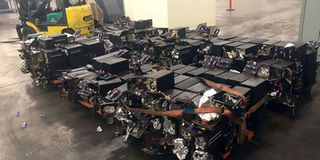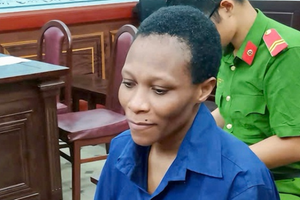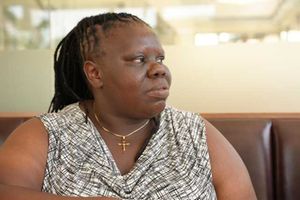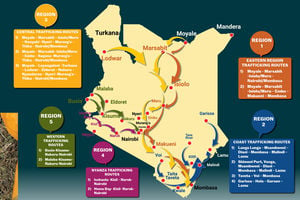
Confiscated drugs hidden in two shipping containers carrying audio equipment bound for Australia, in California city on February 8, 2019. Photo | AFP
A new report on drug trafficking has revealed shocking information about how Kenya continues to be exploited by international traffickers.
The International Narcotics Control Strategy report released by the US Department of State has disclosed that a methamphetamine production lab linked to a dangerous Mexican cartel had been in operation at Namanga until September 2024. Namanga is located at Kenya’s border with Tanzania.
Methamphetamine, popularly known as meth or crystal meth, is a synthetic, addictive drug that stimulates the central nervous system.
“A major accomplishment in 2024 was the multiagency seizure of a large-scale methamphetamine production lab in Namanga, Kenya in September. The lab was linked to the Mexican Cartel de Jalisco Nueva Generación (CJNG) and was the first confirmed large-scale operation by a Mexican cartel operating in Kenya,” states the report dated March 2025.
Although it was unclear whether the drugs were supplied locally and how long the lab had been in operation, the US cautioned that domestic drug production in Kenya is on the rise.
The report added that, a month later, on October 4, Kenyan officials arrested a CJNG member trying to depart to Mexico. The arrest was made based on information passed from the US.
However, the document, an annual report by the Department of State to Congress, did not reveal the deported cartel member’s identity.
These operations were carried out by a multiagency team that comprised a 'Sensitive Investigations Unit (SIU)’ that specialises in drug investigations under the mentorship of the US Drug Enforcement Administration (DEA).
Cartel de Jalisco Nueva Generación, also known as Jalisco New Generation cartel is one of the most notorious violent criminal gangs in Mexico.
On February 20, 2025, it was among eight groups that were designated as Foreign Terrorist Organisations and Specially Designated Global Terrorists by the Donald Trump government.
Others were the Tren de Aragua, Mara Salvatrucha (MS-13), Cártel de Sinaloa, Cártel del Noreste, La Nueva Familia Michoacana, Cártel de Golfo, and Cárteles Unidos.
The US identifies CJNG as a transnational organisation with a presence in nearly every part of Mexico and contacts across the Americas, Australia, China, and Southeast Asia.
The group is also said to engage in extortion, migrant smuggling, oil and mineral theft, as well as weapons trade.
In addition, it was cited for conducting intimidating acts of violence on Mexican military and police with military grade weaponry, the use of drones to drop explosives on Mexican law enforcement, and assassinations or attempted assassinations of Mexican officials.
“Drug trafficking continues to be one of the drivers of corruption in Kenya. Despite a stringent anti-narcotics and anti-corruption legal regime, prosecution and conviction rates remain significantly low. Political will to fight corruption also remains a challenge,” the report added.
Porous borders
Kenya has occasionally been in the spotlight for being exploited for international drug trafficking due to its porous borders and prime location on the East African coast that enables transportation to Latin America, Southwest Asia, Europe and Arabian countries.
Apart from drug hauls destined for foreign countries being intercepted in Kenya in the past, several Kenyans are incarcerated abroad after being found transporting narcotics while some foreign nationals have also been arrested in Kenya for the same.
The latest case is of Margaret Nduta, a 37-year-old Kenyan who was sentenced to death in Vietnam for smuggling cocaine.
In the US, Ibrahim Akasha and Baktash Akasha are serving 23 and 25 year jail terms respectively for drug trafficking. Baktash was sentenced on August 16, 2018 while Ibrahim’s sentence was on January 10, 2020.
The two were extradited to the US where they pleaded guilty to several charges including conspiring to import and importing heroin and methamphetamine into the US, conspiring to use and carry machineguns and destructive devices in connection with their drug-trafficking crimes, and obstructing justice by paying bribes to Kenyan officials in an effort to avoid being extradited to the US.
In November 2024, their co-accused, Pakistani national Asif Hafeez aka ‘Sultan’, pleaded guilty in a Manhattan federal court to conspiring to import heroin, methamphetamine, and hashish into the US. Hafeez was extradited from London to the US on May 12, 2023.
According to court records, Hafeez served as one of the primary suppliers of narcotics to the Akashas. He is still awaiting sentencing.
Last month, Mombasa Senior Resident Magistrate David Odhiambo presided over the destruction of narcotics worth over Sh300 million at the Bamburi Cement incinerator.
According to the Judiciary, the narcotics were exhibits in various cases where the accused persons were convicted and sentenced to varied terms ranging from 20 to 40 years in prison.










